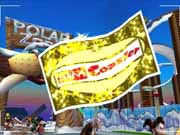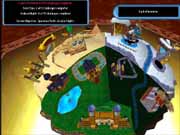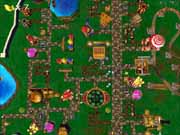SimCoaster is the third game in Bullfrog's series of amusement-park-themed business simulators. It's the sequel to last year's SimTheme Park, which itself was a sequel to 1994's Theme Park. SimTheme Park differentiated itself from Theme Park by hiding much of Theme Park's notorious micromanagement elements, so it let you concentrate on building and expanding your park while managing the minutiae only as you saw fit. The goals were invisible, but certain benchmarks regarding income, crowd capacity, and so forth gave you rewards. SimCoaster dismisses the elegant design of its predecessor and instead favors the often overwhelming amount of management found in the original Theme Park. It also gives you very specific goals that must be completed to progress further into the game.

If it weren't for the significant changes to the gameplay, SimCoaster would look like an expansion pack to SimTheme Park. This is primarily because it uses the same engine as that of its predecessor. And mechanically, it plays the same as SimTheme Park. You place rides, paths, shops, decorative features, and sideshow attractions. Placement is key, and you want to make sure your guests are always on rides or spending money and that your guests always have easy access to the next diversion once they've finished the last. You can also choose to wander around your park in the first-person camcorder view, a nice feature that lets you witness everything from a visitor's perspective as opposed to your normal, all-seeing overview.
The most obvious change in SimCoaster is that there is more of an overarching goal. You begin as an employee of a theme-park management company. By successfully completing challenges and objectives assigned to you by the owners, you'll earn more stock, get promotions, open new areas to build in, and gain access to special rides. Objectives are different from challenges. The first are your overall goals for that time, and these are usually related to expansion. A typical objective will be to find some way to remove a lake so that you can build there. Challenges are ways of testing your management mettle, and they include assignments like keeping a certain number of guests in your park or keeping your employees happy for a predetermined amount of time. Often, your objectives will be to succeed at a certain number of challenges.

In theory, it's a nice change from SimTheme Park's very open-ended gameplay. In reality, the challenges serve only to add a layer between you and the game. The challenges reward you for almost exactly the same types of things as in SimTheme Park. The difference is that instead of simply being rewarded for having been a good manager for a period of time, you must choose the block of time during which your skills will be judged. It doesn't add complexity, just complication.
What's more problematic is that these additions take your attention away from the enjoyable part of the game: building and planning your park. In SimTheme Park and Chris Sawyer's extremely popular RollerCoaster Tycoon, the objectives seem directly tied to your ability to design a high-quality park. In SimCoaster, the goals are much more focused on management. The original Theme Park was a business management simulator disguised as an amusement park game, and SimCoaster returns to these roots. The problems you deal with will be numerous and varied.
You wear many hats in SimCoaster. You're the park planner, the labor manager, the accountant, and the head of security. You must constantly deal with problems, from employees wanting raises to unruly kids setting fire to your bushes and trash cans. Once your park gets big, the problems come fast and furious, and it can get more than a little frustrating when you're trying to build an expansion area at the same time. Your advisor will pop up to inform you of problems, and eventually she's almost always onscreen alerting you of one imminent disaster or another. You can always turn off her commentary, but you would miss many important problems. An e-mail-like message system, which is the other means of learning about significant events, is easy to overlook when you're putting out fires all over your park.
Like SimTheme Park, SimCoaster features different zones. After you complete a few objectives in one zone, another will become available. The zones are supposed to be part of the same park, but they are very distinct areas. They aren't connected, other than on the larger, overview map, and your monetary earnings in one are unaffected by the others. The zones are the retro-science-fiction of the Land of Invention, the icy Polar Zone, and the desert landscape of Arabian Knights. As in SimTheme Park, the only real differences between the zones are the difficulty (determined by the amount of space and the variety of rides and attractions available to you at the start) and the graphics. Each zone features the same basic rides--just with a graphical change that suits the theme.

The rides in SimCoaster are imaginative, but nowhere near as fantastic as those found in SimTheme Park. There are no huge apes spinning bananas over their heads. The misleading title would have you believe that the emphasis in SimCoaster is on designing and building roller coasters, but, in fact, the title seems like little more than an attempt to cash in on the incredible success of RollerCoaster Tycoon. There are a wide variety of coasters in SimCoaster, but, unlike in Chris Sawyer's game, they are not based on real-world and theoretical coasters. The coaster design kit lets you design thrill rides when you are not actually working in your park, but SimCoaster's track editor is simpler, and less satisfying, than the one in RollerCoaster Tycoon. The only real advantage in SimCoaster is that you can actually ride the coasters you design.
Unless you crave micromanagement, you'll find SimCoaster to be less satisfying than RollerCoaster Tycoon overall. This fact seems ironic given that RollerCoaster Tycoon was clearly inspired by the original Theme Park. It's true that SimCoaster is a better-looking game than the relatively older RollerCoaster Tycoon, but even SimCoaster's engine is starting to look dated--its colorful rides and attractions don't look as crisp as they did a year ago. However, the design of the game's scenery is imaginative, and wandering around your park can be fun. It can be especially enjoyable considering that there are a variety of new types of guests in the game since SimTheme Park. In addition to children, you'll see adults and seniors wandering around. The seniors actually add a strange element to the game--you'll occasionally get reports that someone is saying bad things about your park and that you should call a security guard to stop the person. It seems that basic human rights don't apply in SimCoaster's amusement parks.

In a case like this, you simply right-click on the unruly guest and select "call guard for discipline." SimCoaster has added a number of convenient interface options, and you can right-click on anything--from guests to vomit--to get a list of actions you can take. Unfortunately, there are some small problems with the interface. Once you open an interface window, you can't open another until you manually close the active one. Though your scientists all hang out in the research lab, you can't actually hire them from the lab. It's unintuitive and inconvenient at times when you want to put more scientists on a particular project.
Much of SimCoaster seems inconvenient. SimTheme Park was enjoyable and easy to play, though there were complex mechanics going on beneath the surface. SimCoaster just brings all the complexity to the surface, without adding any real sense of reward for making you jump through the continuous hoops it places in front of you. The resulting game seems to focus on all the wrong elements. Instead of letting you create a park and watch your guests enjoy it, the game makes you spend most of your time fretting about things like having to give a two-dollar raise to a guy in an animal suit.